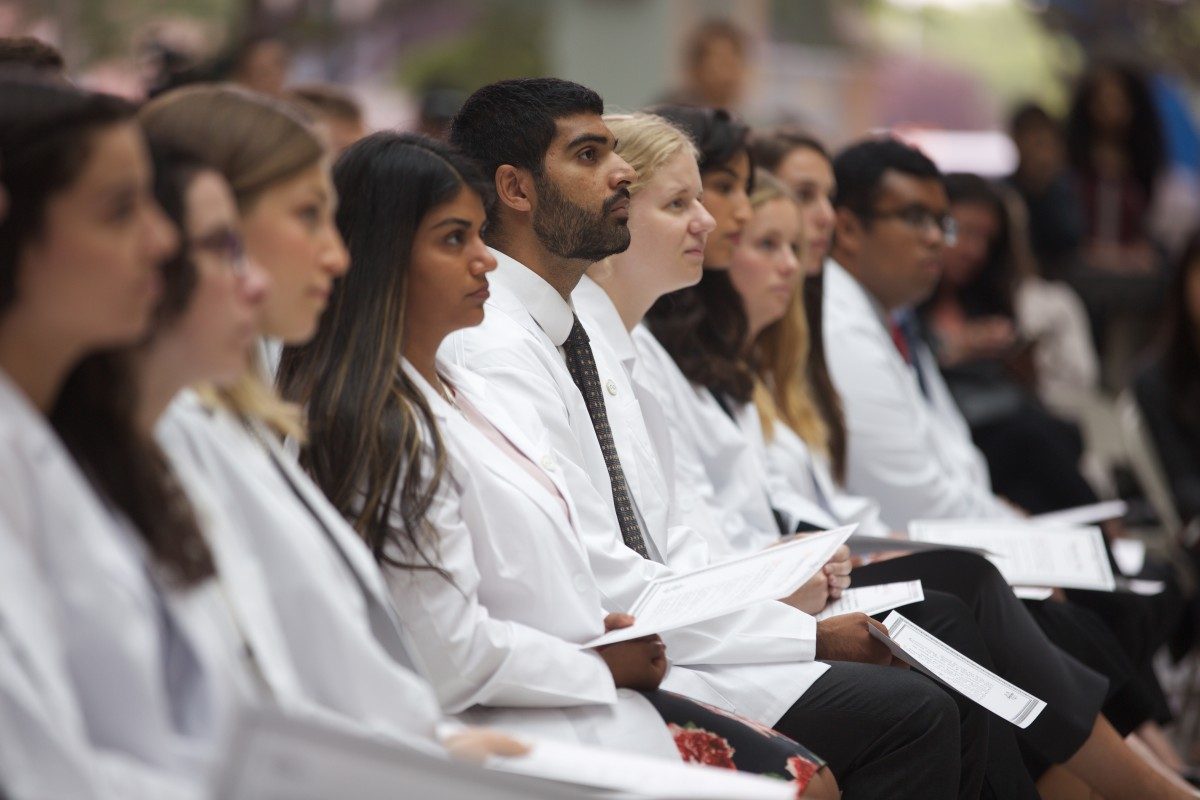
New med students urged to serve with passion, humility
A distinguished U of M alumnus addressed first-year medical students this week, urging them to let their passions burn brightly and believe in possibilities such as curing cancer.
“I found my passion in these buildings,” Dr. Trevor Young, dean of the University of Toronto Faculty of Medicine, told the Class of 2021 at Inaugural Exercises for the Max Rady College of Medicine on Aug. 23.
“It took me to the lab, it took me to the clinic.… I know you’ll find your own passion,” added the 1983 medicine graduate, a psychiatrist and expert on bipolar disorder, in his Alan Klass Memorial Address.
In Young’s student days, he recalled, it seemed impossible that diseases such as AIDS would one day have high survival rates.
“As you begin your studies, I hope you will maintain a sense of awe at what is possible,” he said. “Maybe it’s preventing teenage suicide. Maybe it’s stopping dementia from occurring. Maybe it’s addressing the opiate dependency crisis, or finding more equity [for] our First Nations or new Canadians.”
Young said the U of M’s commitment to Indigenous health and its recent launch of Ongomiizwin, the Indigenous Institute of Health and Healing in the Rady Faculty of Health Sciences, have made a “bold statement” and inspired leaders at the University of Toronto.
“It makes me proud to be an alumnus, seeing what you’ve been able to do here,” Young said.
At the event in the Brodie Centre Atrium on the Bannatyne campus, the Class of 2021 received their first white coats and recited the Hippocratic Oath to practise medicine ethically.
Of the 110 students, 105 (95 per cent) are Manitoban. The class includes 11 students of self-declared Indigenous ancestry and 36 students with rural attributes.
The class’s ethnic and socio-economic diversity reflects the Max Rady College of Medicine’s inclusive admissions policy. Half the students come from families with incomes under $75,000 and three students came to Canada as refugees.
Kelvin Goertzen, provincial minister of health, seniors and active living, told the medical rookies, “You are taking on one of the most difficult occupations, but the one that has the most potential to impact people in the most direct ways.”
Dr. Brian Postl, dean of the Max Rady College of Medicine, dean of the Rady Faculty of Health Sciences and vice-provost (health sciences), reminded the future doctors to maintain their humility.
“Remember, this is not about you,” Postl said. ”It will always be about your service to patients, the development of new science and the needs of your community.”
Sydnee Tuckett, a 29-year-old Métis student, has worked as a paramedic in The Pas and surrounding communities. Her goal as a physician, she said, will be to serve Indigenous people and have a voice in social change. “I want to participate in closing the gap in communication and trust between Indigenous people and the health-care community,” she said.
At 19 years old, Henry Li is the youngest member of the class. The high achiever earned university credits at Fort Richmond Collegiate through the Advanced Placement program, allowing him to finish his bachelor of science in only two years. Li said about taking the Hippocratic Oath, “It was powerful, hearing all 110 of us recite this commitment to helping others.”
Justin Feilberg, 33, is starting medical school as his son enters Grade 1. Raised on a farm and now living in Steinbach, Feilberg wants to provide rural health care. The birth of his son, he said, compelled him to pursue his long-held dream of becoming a doctor.
“I wanted him to see that even if the odds seem stacked against you, it’s OK to dream big and set your sights on whatever you think you’re capable of doing,” Feilberg said.






